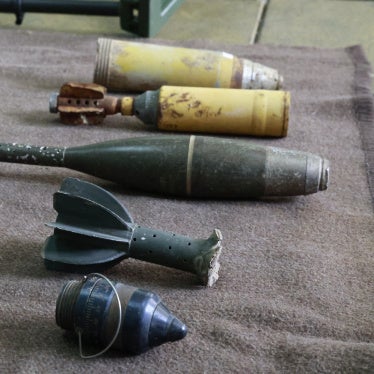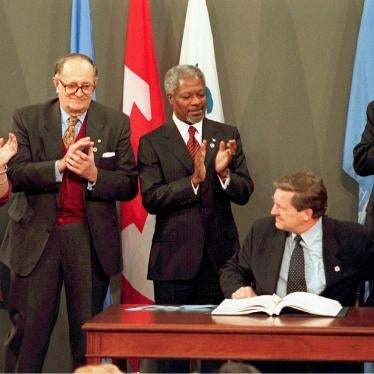When the cluster bombs fell on the town of Kaunda in Sudan’s Nuba Mountains in late May, local authorities collected the bomblets that were scattered about and placed them in a hole, covered it with dirt, and marked the spot with a thorn bush. After recent cluster munition rocket attacks in Syria and Yemen, some locals have taken to tying a long piece of rope around each unexploded submunition then pulling hard from a distance in an attempt to detonate and destroy it without being killed or maimed.
It goes without saying that such dangerous and desperate measures are no replacement for systematic survey and comprehensive clearance efforts. However, they demonstrate the lengths that local people will go to during conflict to try to protect their communities from cluster munitions.
Over the past year, we have met many victims — all too often children — who have been wounded after handling bomblets. We have seen many families grieving for relatives killed when their homes were hit in cluster munition rocket attacks and from cluster bombs used in airstrikes.
New use of air-dropped and ground-launched cluster munitions is unfortunately adding to the costly and deadly global legacy of explosive remnants of war that remain long after wars end. In addition to Sudan, Syria, and Yemen, cluster munitions have also been used this year in Libya and Ukraine. Saudi Arabia is leading a coalition of states that has used at least three types of US-made cluster munitions in Yemen this year. None of these countries have joined the Convention on Cluster Munitions, a 2008 treaty signed by 117 countries banning cluster munitions because they kill indiscriminately and leave behind unexploded bomblets that leave the land unsafe until they are cleared.
On Sept. 9, ministers and other high-level representatives from 62 states party to the Convention on Cluster Munitions adopted the Dubrovnik Declaration, a political commitment to work for a world free of cluster munitions that includes strong condemnation of any use of the weapons even by states that have not signed the treaty banning their use. After all, the Convention on Cluster Munitions requires each state party to “make its best efforts to discourage States not party … from using cluster munitions.”
This new declaration, adopted at the treaty’s First Review Conference, presents an opportunity to build upon the already substantial gains against the use of cluster munitions made since the treaty entered into force on August 1, 2010, becoming binding international law. It reaffirms states parties’ commitment to fully implement all provisions of the Convention on Cluster Munitions, and an accompanying action plan lays out the path for further progress over the next five years, leading to the Second Review Conference in 2020.
States parties are making impressive progress eradicating cluster munitions under the treaty. For example, there have been no confirmed reports or allegations of new use of cluster munitions by any parties to the treaty. These countries are also adhering to the convention’s absolute prohibition on any production, transfer, and stockpiling of cluster munitions and are working to destroy their stocks, clear land contaminated by cluster munition remnants, and assist victims of the weapons
Since 2010, 532,938 cluster munitions and 85 million submunitions have been destroyed from stockpiles. More than dozen states parties have finished destroying their stockpiles since 2010, including Canada in 2014 and Japan in February 2015.
During 2014 alone, eight states parties destroyed 121,585 cluster munitions and 16.4 million submunitions from their stocks. France, Germany, Italy, and other states parties are working to complete their stockpile destruction in 2015, ahead of the convention’s eight-year deadline.
Nine countries have acceded to the convention since August 2010, including Belize, Guyana, Palestine, and Slovakia in the past year.
Yet as we’ve seen in recent years, much work remains. Some 47 of the 80 countries that have not yet joined are believed to stockpile cluster munitions. Each year there are new victims from new and old cluster munition remnants. There is a need to redouble efforts to get countries to join the treaty and start destroying their stockpiles.
China, Serbia, South Sudan, Vietnam, and 18 other nations that have not banned cluster munitions nonetheless participated as observers in the treaty’s Review Conference, where they expressed support for the treaty’s humanitarian objectives. Cuba made the surprise announcement that it has started to carry out the required constitutional procedures to accede to the Convention on Cluster Munitions.
The United States did not participate in the Oslo Process, which resulted in the 2008 adoption of the Convention on Cluster Munitions and has never attended a meeting of the treaty. Unlike other states that have yet to ban cluster munitions, the US does not abide by the provisions of the convention as it still produces, exports, and stockpiles cluster munitions and retains the right to use them despite not doing so since 2009.
The US often states that is the world’s biggest donor to programs that clear and destroy landmines, cluster munitions, and explosive remnants of war. Over the past year administration officials have made more statements than ever before expressing concern at new use of cluster munitions and calling for investigations. It has also destroyed huge amounts of its stockpiled cluster munitions in recent years and in three years will ban the use of all but a tiny fraction of its stockpile.
The Dubrovnik Declaration seeks to “ensure that cluster munitions remain a stigmatized weapon” and it is clear that the emerging international norm against these weapons is beginning to take hold.
Most countries that used cluster munitions in 2015 have denied it, indicating that the stigma against cluster munitions is now so strong that they don’t want to be associated with these weapons. But all countries need to relinquish use of these weapons and join the treaty. People in war zones shouldn’t have to take their lives in their hands trying to protect their neighbors and their children from the deadly legacy that cluster munitions create.









